Related Research Articles
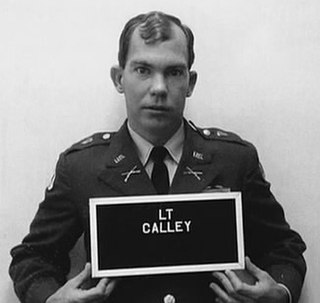
William Laws Calley Jr. was a United States Army officer convicted by court-martial of the murder of 22 unarmed South Vietnamese civilians in the My Lai massacre on March 16, 1968, during the Vietnam War. Calley was released to house arrest under orders by President Richard Nixon three days after his conviction. The United States District Court for the Middle District of Georgia granted him a new trial, but that ruling was overturned by the United States Court of Appeals for the Fifth Circuit. His initial life sentence having been modified to a term of 20 years and then further reduced to ten, Calley ultimately served three years of house arrest for the murders. Public opinion at the time about Calley was divided. After his dismissal from the U.S. Army and release from confinement, Calley avoided public attention.

Fragging is the deliberate or attempted killing of a soldier, usually a superior, by a fellow soldier. U.S. military personnel coined the word during the Vietnam War, when such killings were most often committed or attempted with a fragmentation grenade, to make it appear that the killing was accidental or during combat with the enemy. The term fragging now encompasses any deliberate killing of military colleagues.

The United States Disciplinary Barracks (USDB), colloquially known as Leavenworth, is a military correctional facility located on Fort Leavenworth, a United States Army post in Kansas. It is one of two major prisons built on Fort Leavenworth property, the other is the military Midwest Joint Regional Correctional Facility, which opened on 5 October 2010. Together the facilities make up the Military Corrections Complex which is under the command of its commandant, who holds the rank of colonel, and serves as both the Army Corrections Brigade Commander and Deputy commander of The United States Army Corrections Command.
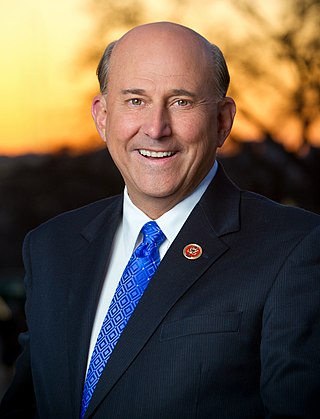
Louis Buller Gohmert Jr. is an American attorney, politician, and former judge who was the U.S. representative from Texas's 1st congressional district from 2005 to 2023. Gohmert is a Republican and was part of the Tea Party movement. In January 2015, he unsuccessfully challenged John Boehner for Speaker of the House of Representatives. In November 2021, he announced his candidacy in the 2022 Texas Attorney General election. He failed to advance to the Republican primary runoff, finishing fourth with 17% of the vote. His political positions are often considered far-right.
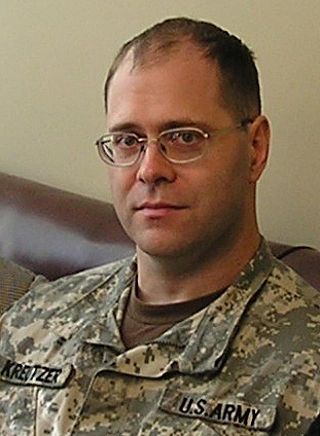
William J. Kreutzer Jr. is a former United States Army soldier who was convicted of killing one officer and wounding 18 other soldiers when he opened fire on a physical training formation on October 27, 1995, at Fort Bragg, North Carolina. Kreutzer was sentenced to death, but his sentence was later commuted to life in prison by the Army Court of Criminal Appeals in connection with concerns regarding mental illness.
Joshua R. Claus is a former member of the United States Army, whose unit was present at both Iraq's Abu Ghraib and at the Bagram Theater Detention Facility in Afghanistan, and was the first interrogator of Guantanamo detainee Omar Khadr. In 2005, he was found guilty of maltreatment and assault against an Afghanistan detainee who later died.
The United States Armed Forces and its members have violated the law of war after the signing of the Hague Conventions of 1899 and 1907 and the signing of the Geneva Conventions. The United States prosecutes offenders through the War Crimes Act of 1996 as well as through articles in the Uniform Code of Military Justice. The United States signed the 1999 Rome Statute but it never ratified the treaty, taking the position that the International Criminal Court (ICC) lacks fundamental checks and balances. The American Service-Members' Protection Act of 2002 further limited US involvement with the ICC. The ICC reserves the right of states to prosecute war crimes, and the ICC can only proceed with prosecution of crimes when states do not have willingness or effective and reliable processes to investigate for themselves. The United States says that it has investigated many of the accusations alleged by the ICC prosecutors as having occurred in Afghanistan, and thus does not accept ICC jurisdiction over its nationals.
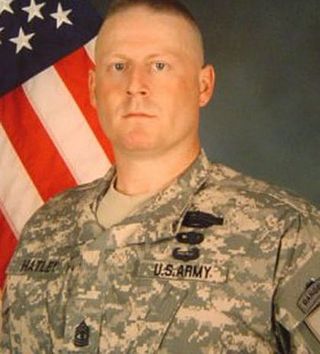
John E. Hatley is a former first sergeant who was prosecuted by the United States Army in 2008 for murdering four Iraqi detainees near Baghdad, Iraq in 2006. He was convicted in 2009 and sentenced to life in prison at the Fort Leavenworth Disciplinary Barracks. He was released on parole in October 2020. Hatley is colloquially associated with a group of US military personnel convicted of war crimes known as the Leavenworth 10.

Beaudry Robert "Bowe" Bergdahl is a former United States Army soldier who was held captive from 2009 to 2014 by the Taliban-aligned Haqqani network in Afghanistan and Pakistan.

Michael Chase Behenna is a former United States Army First Lieutenant who was convicted of the 2008 murder of Ali Mansur Mohamed during the occupation of Iraq. Behenna is colloquially associated with a group of U.S. military personnel convicted of war crimes known as the Leavenworth 10. He was sentenced to 25 years imprisonment, which was later reduced to 15 years, and served his sentence in the United States Disciplinary Barracks on Fort Leavenworth, a United States Army post in Kansas. He was granted parole on March 14, 2014, after serving less than five years of his sentence. Since his release from prison he has worked as a farmhand. On May 6, 2019, Behenna received a pardon from President Donald Trump.

The Maywand District murders were the thrill killings of at least three Afghan civilians perpetrated by a group of U.S. Army soldiers from January to May 2010, during the War in Afghanistan. The soldiers, who referred to themselves as the "Kill Team", were members of the 3rd Platoon, Bravo Company, 2nd Battalion, 1st Infantry Regiment, and 5th Brigade, 2nd Infantry Division. They were based at FOB Ramrod in Maiwand, in Kandahar Province of Afghanistan.
The murder of Mohebullah refers to the 2010 shooting of prisoner Mohebullah in Afghanistan by a US soldier who later pleaded guilty and was convicted by a U.S. military judge.
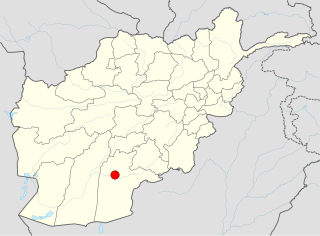
The Kandahar massacre, also called the Panjwai massacre, was a mass murder that occurred in the early hours of 11 March 2012, when United States Army Staff Sergeant Robert Bales murdered 16 Afghan civilians and wounded six others in the Panjwayi District of Kandahar Province, Afghanistan. Nine of his victims were children, and 11 of the dead were from the same family. Some of the corpses were partially burned. Bales was taken into custody later that morning when he told authorities, "I did it".

Robert Bales is an American mass murderer and former Army sniper who killed 16 Afghan civilians in a mass shooting in Panjwayi District, Kandahar Province, Afghanistan, on March 11, 2012 – an event known as the Kandahar massacre.
Clint Allen Lorance is a former United States Army officer who is known for having been convicted and pardoned for war crimes related to the killing of two Afghan civilians.

The 2011 Helmand Province killing was the manslaughter of a wounded Taliban insurgent by Alexander Blackman, which occurred on 15 September 2011. Three Royal Marines, known during their trial as Marines A, B, and C, were anonymously tried by court martial. On 8 November 2013, Marines B and C were acquitted, but Blackman was initially found guilty of murder of the Afghan insurgent, in contravention of section 42 of the Armed Forces Act 2006. This made him the first British soldier to be convicted of a battlefield murder whilst serving abroad since the Second World War.
Major Mathew L. Golsteyn is a United States Army officer who served in the War in Afghanistan. He was charged with murder after the summary killing of an Afghan civilian detainee in Marjah, whom he claims was a bomb maker for the Taliban. Golsteyn's case came to prominence after U.S. President Donald Trump said that he would review Maj. Golsteyn's case. Golsteyn received a presidential pardon on 15 November 2019.
War crimes in Afghanistan covers the period of conflict from 1979 to the present. Starting with the Soviet invasion of Afghanistan in 1979, 40 years of civil war in various forms has wracked Afghanistan. War crimes have been committed by all sides.
References
- 1 2 3 4 5 6 7 8 9 10 11 "US soldier sentenced to life in prison for Afghan civilian murder". The Guardian. July 28, 2011.
- ↑ "The Man Pushing The Trump Administration to Pardon Combat Veterans". Vice News. May 29, 2019 – via YouTube.
- 1 2 3 4 5 6 Rountree, Mark (March 21, 2019). "Former military prisoner released from Disciplinary Barracks". The Leavenworth Times - Leavenworth, KS.
- 1 2 3 4 5 6 7 Chiaramonte, Perry (June 2, 2017). "Texas congressman asks Trump for full review of 'Leavenworth 10' cases". Fox News.
- 1 2 3 4 5 6 7 8 9 10 11 Dodd, Cameron (October 19, 2018). "Frederick-raised guardsman who killed Afghan civilian seeks parole". The Frederick News-Post.
- 1 2 3 4 5 6 7 Nozicka, Luke (May 20, 2019). "Soldier convicted of Afghan murder leaves Leavenworth prison, hopes for Trump's pardon". The Kansas City Star.
- ↑ Taylor, Kelli (May 20, 2019). "Soldier convicted of murder freed from Fort Leavenworth military prison". KCTV Kansas City.
- 1 2 3 4 5 "Wife defends guardsman charged in Afghan murder". Fox News. March 27, 2015.
- ↑ Rountree, Mark (May 21, 2019). "Patriot group helps Leavenworth prisoner win release". The Ottawa Herald.
- 1 2 3 4 5 6 Joshua Hersh (May 29, 2019). "Meet the Man Pushing the Trump Administration to Pardon Combat Veterans," Vice.
- 1 2 Philipps, Dave (May 19, 2016). "Shared Mission to Pardon U.S. Soldiers Who Killed Civilians". The New York Times.
- 1 2 "Former Conn. Nat'l Guardsman found guilty in Afghan civilian's murder". The Bulletin. July 28, 2011.
- ↑ Ghianni, Tim (July 28, 2011). "U.S. soldier found guilty of killing Afghan civilian". Reuters.
- 1 2 3 4 5 "US soldier guilty of Afghan death". BBC. July 28, 2011.
- ↑ Rempfer, Kyle (June 18, 2019). "Derrick Miller's supporters say the man he shot was a Taliban scout. Now they are seeking a Trump pardon of his life sentence". Army Times.
- ↑ Hall, Kristin M. (July 25, 2011). "Lawyer: Army Guardsman shot Afghan in self-defense". Hartford Courant.
- ↑ Llorente, Elizabeth (March 20, 2018). "More veterans seek Trump's pardon for combat-zone convictions". Fox News.
- ↑ Jasmine Pelaez (March 22, 2019). "National Guardsman released on parole after serving eight years in military prison," Local DVM News.
- ↑ "Congressman Gohmert on Sergeant Derrick Miller Being Granted Parole". The Gilmer Mirror. April 2019.
- ↑ Edwards, Josh (June 5, 2019). "Gohmert welcomes home Guardsman". The Daily Sentinel.
- ↑ Hinneburg, Cheryl (April 12, 2019). "US Army Nat'l Guardsman gets parole after being sentenced to life for murder". American Military News.
- ↑ "Sgt Derrick Miller joins S&F to discuss the 8 yrs he served in prison for “murder” after killing a Taliban operative," WCBM, October 15, 2019,
- ↑ "Justice for Warriors," The Sean Hannity Show, September 18, 2019.